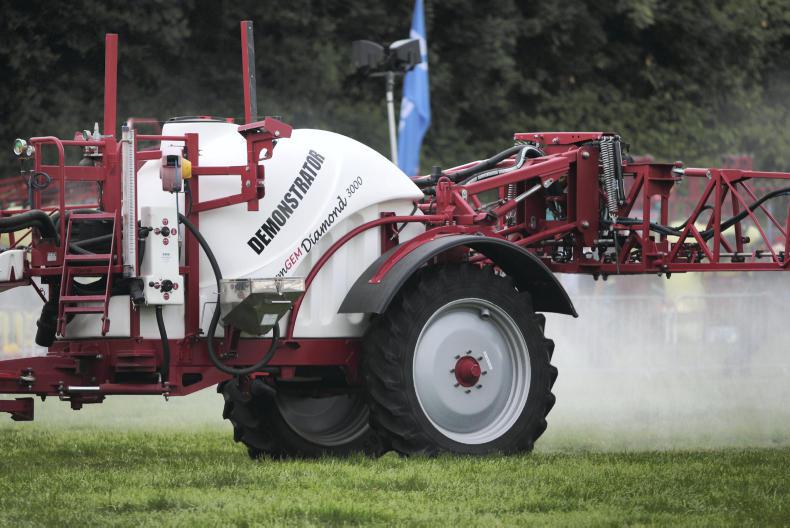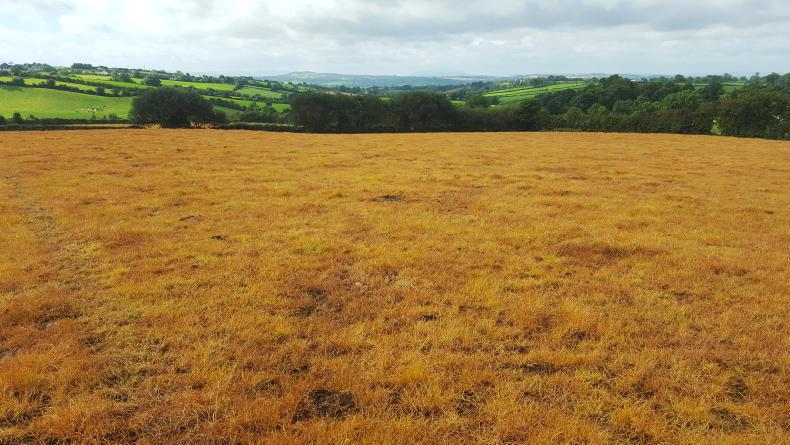Glyphosate has proven itself to be a very useful and important tool in all aspects of modern agriculture. It has become a critical input for commercial farming systems that aim to help conserve soil carbon while reducing fossil fuel requirement.
Its loss would have significant implications for farming and it would also be a significant loss for consumers who use it to help tidy up around homes and gardens.
What’s happening to glyphosate is much bigger than just that single active. The prolonged debate is where science departed from populist opinion.
Basically, the process of approving and registering chemical actives has been pulled into the political arena where member states are being forced by domestic politics to take up a position on certain votes that bear no relationship to scientific facts.
There is nothing in the pipeline with the capacity to replace or even mildly substitute glyphosate
The problem begins with the fact that food comes from a shop or supermarket. How it gets there is far beyond the capability of most modern digitally connected consumers.
The fact that standards are set by law and by processors to protect the food chain is taken for granted, but these will not be met if the tools of modern agriculture are taken away.
Food retail is now running in two separate streams.
In one, consumers shop with their eyes so selection must be met with cosmetic perfection. The other runs by label, where the word organic is taken to imply that it is free of all unnatural and unwanted substances but it may not look nearly so perfect.
In reality, that is what nature does and the majority of modern production systems are forced to apply inputs to secure market access.
No point in compromising
Back to glyphosate. About 18 months ago this wrangle began following what might have been regarded as a failure of science to be consistent in its understanding of what constitutes credible research and its consequences.
The attempts to find a solution that would re-register glyphosate last year led to compromise that reduced its uses but that still failed to secure agreement.
Now the duration of registration is being challenged with a proposal to decrease from 15 to 10 years and then to five and now three is being talked about. This is a massive compromise that could push many other actives to the point of being economically unviable in the market.
Economic viability
It is important to state that what is happening with glyphosate represents the shape and tone of future pesticide legislation. A process that only enables market access for three to five years is likely to be unattractive to manufacturers. It would challenge the economic viability of re-registration and decrease the attractiveness of developing new actives.
So the consequences go far beyond glyphosate, an active ingredient that is considered by pesticide registration officials as being quite benign. We already know that we will lose quite a number of essential actives from our current toolbox due to the last update in pesticide legislation. And this is happening against a background of resistance development in nature against many of our remaining tools. The plant protection world is no different to the battle against microbes and the issue of antimicrobial resistance.
Double standards
Must we shoot ourselves in the foot to prove that the gun is loaded against us? Are we happy that the food that will flood into the EU when internal producers fail to meet the required standards will be safer than what we produce internally? The EU has long been seen as a highly hypocritical institution and issues like this do nothing to temper this view. Is society in general ready for the consequences of the removal of glyphosate?
If the EU chooses to be so afraid of glyphosate how can it possibly continue to allow the importation of GM maize, soya beans and cotton? Would we see an automatic ban on such important imports? Highly unlikely, as the actions of the EU on many such issues sees the same politicians talking out of both sides of their mouths.

In 2009, the EU imposed a hazard-based process on its registration system. We might not like it – it is causing problems – but it is the law for the internal market.
But where is the same hazard-based system when it comes to the evaluation of imports into the EU?
If these evaluation methodologies are so critical to human health and safety, surely there is cause to re-examine the issue of what can be allowed on imported produce.
EU institutions
The EU registration process has been difficult for all actives in recent years, but we must accept that it is there to ensure the safety of operators, bystanders, the environment and the food itself.
It should be difficult to get a product registered but, given that the process has become so political, what is the justification for maintaining our whole registration process, the European Chemicals Agency, CoRAP, the member state registration divisions and even sections within the European Food Safety Authority, if their evaluations are to be ignored.
Loss to farming
But what would farmers do? There is nothing in the pipeline with the capacity to replace or even mildly substitute glyphosate.
Many of the systems developed to reduce cultivation intensity to help reduce soil carbon loss depend on glyphosate for weed control in stale seedbeds.
Its loss would quickly result in the necessity for increased ploughing to bury menacing weed problems that will inevitably develop.
And even then certain problems will evolve, such as the return of scutch.
Read more
US study clears glyphosate cancer link
Full glyphosate coverage
Glyphosate has proven itself to be a very useful and important tool in all aspects of modern agriculture. It has become a critical input for commercial farming systems that aim to help conserve soil carbon while reducing fossil fuel requirement.
Its loss would have significant implications for farming and it would also be a significant loss for consumers who use it to help tidy up around homes and gardens.
What’s happening to glyphosate is much bigger than just that single active. The prolonged debate is where science departed from populist opinion.
Basically, the process of approving and registering chemical actives has been pulled into the political arena where member states are being forced by domestic politics to take up a position on certain votes that bear no relationship to scientific facts.
There is nothing in the pipeline with the capacity to replace or even mildly substitute glyphosate
The problem begins with the fact that food comes from a shop or supermarket. How it gets there is far beyond the capability of most modern digitally connected consumers.
The fact that standards are set by law and by processors to protect the food chain is taken for granted, but these will not be met if the tools of modern agriculture are taken away.
Food retail is now running in two separate streams.
In one, consumers shop with their eyes so selection must be met with cosmetic perfection. The other runs by label, where the word organic is taken to imply that it is free of all unnatural and unwanted substances but it may not look nearly so perfect.
In reality, that is what nature does and the majority of modern production systems are forced to apply inputs to secure market access.
No point in compromising
Back to glyphosate. About 18 months ago this wrangle began following what might have been regarded as a failure of science to be consistent in its understanding of what constitutes credible research and its consequences.
The attempts to find a solution that would re-register glyphosate last year led to compromise that reduced its uses but that still failed to secure agreement.
Now the duration of registration is being challenged with a proposal to decrease from 15 to 10 years and then to five and now three is being talked about. This is a massive compromise that could push many other actives to the point of being economically unviable in the market.
Economic viability
It is important to state that what is happening with glyphosate represents the shape and tone of future pesticide legislation. A process that only enables market access for three to five years is likely to be unattractive to manufacturers. It would challenge the economic viability of re-registration and decrease the attractiveness of developing new actives.
So the consequences go far beyond glyphosate, an active ingredient that is considered by pesticide registration officials as being quite benign. We already know that we will lose quite a number of essential actives from our current toolbox due to the last update in pesticide legislation. And this is happening against a background of resistance development in nature against many of our remaining tools. The plant protection world is no different to the battle against microbes and the issue of antimicrobial resistance.
Double standards
Must we shoot ourselves in the foot to prove that the gun is loaded against us? Are we happy that the food that will flood into the EU when internal producers fail to meet the required standards will be safer than what we produce internally? The EU has long been seen as a highly hypocritical institution and issues like this do nothing to temper this view. Is society in general ready for the consequences of the removal of glyphosate?
If the EU chooses to be so afraid of glyphosate how can it possibly continue to allow the importation of GM maize, soya beans and cotton? Would we see an automatic ban on such important imports? Highly unlikely, as the actions of the EU on many such issues sees the same politicians talking out of both sides of their mouths.

In 2009, the EU imposed a hazard-based process on its registration system. We might not like it – it is causing problems – but it is the law for the internal market.
But where is the same hazard-based system when it comes to the evaluation of imports into the EU?
If these evaluation methodologies are so critical to human health and safety, surely there is cause to re-examine the issue of what can be allowed on imported produce.
EU institutions
The EU registration process has been difficult for all actives in recent years, but we must accept that it is there to ensure the safety of operators, bystanders, the environment and the food itself.
It should be difficult to get a product registered but, given that the process has become so political, what is the justification for maintaining our whole registration process, the European Chemicals Agency, CoRAP, the member state registration divisions and even sections within the European Food Safety Authority, if their evaluations are to be ignored.
Loss to farming
But what would farmers do? There is nothing in the pipeline with the capacity to replace or even mildly substitute glyphosate.
Many of the systems developed to reduce cultivation intensity to help reduce soil carbon loss depend on glyphosate for weed control in stale seedbeds.
Its loss would quickly result in the necessity for increased ploughing to bury menacing weed problems that will inevitably develop.
And even then certain problems will evolve, such as the return of scutch.
Read more
US study clears glyphosate cancer link
Full glyphosate coverage







 This is a subscriber-only article
This is a subscriber-only article











SHARING OPTIONS: